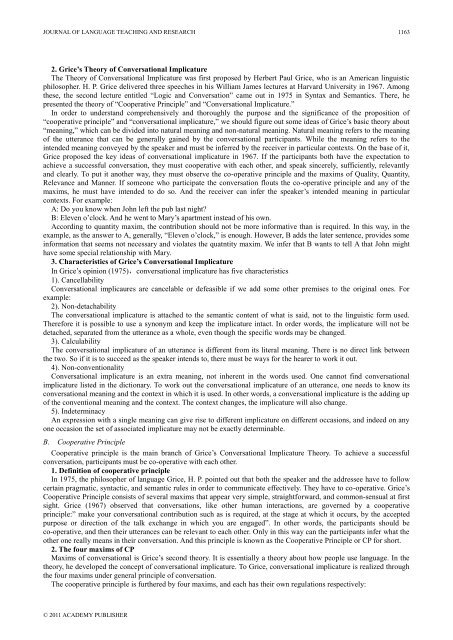Journal of Language Teaching and Research Contents - Academy ...
Journal of Language Teaching and Research Contents - Academy ...
Journal of Language Teaching and Research Contents - Academy ...
Create successful ePaper yourself
Turn your PDF publications into a flip-book with our unique Google optimized e-Paper software.
JOURNAL OF LANGUAGE TEACHING AND RESEARCH<br />
2. Grice’s Theory <strong>of</strong> Conversational Implicature<br />
The Theory <strong>of</strong> Conversational Implicature was first proposed by Herbert Paul Grice, who is an American linguistic<br />
philosopher. H. P. Grice delivered three speeches in his William James lectures at Harvard University in 1967. Among<br />
these, the second lecture entitled “Logic <strong>and</strong> Conversation” came out in 1975 in Syntax <strong>and</strong> Semantics. There, he<br />
presented the theory <strong>of</strong> “Cooperative Principle” <strong>and</strong> “Conversational Implicature.”<br />
In order to underst<strong>and</strong> comprehensively <strong>and</strong> thoroughly the purpose <strong>and</strong> the significance <strong>of</strong> the proposition <strong>of</strong><br />
“cooperative principle” <strong>and</strong> “conversational implicature,” we should figure out some ideas <strong>of</strong> Grice’s basic theory about<br />
“meaning,” which can be divided into natural meaning <strong>and</strong> non-natural meaning. Natural meaning refers to the meaning<br />
<strong>of</strong> the utterance that can be generally gained by the conversational participants. While the meaning refers to the<br />
intended meaning conveyed by the speaker <strong>and</strong> must be inferred by the receiver in particular contexts. On the base <strong>of</strong> it,<br />
Grice proposed the key ideas <strong>of</strong> conversational implicature in 1967. If the participants both have the expectation to<br />
achieve a successful conversation, they must cooperative with each other, <strong>and</strong> speak sincerely, sufficiently, relevantly<br />
<strong>and</strong> clearly. To put it another way, they must observe the co-operative principle <strong>and</strong> the maxims <strong>of</strong> Quality, Quantity,<br />
Relevance <strong>and</strong> Manner. If someone who participate the conversation flouts the co-operative principle <strong>and</strong> any <strong>of</strong> the<br />
maxims, he must have intended to do so. And the receiver can infer the speaker’s intended meaning in particular<br />
contexts. For example:<br />
A: Do you know when John left the pub last night?<br />
B: Eleven o’clock. And he went to Mary’s apartment instead <strong>of</strong> his own.<br />
According to quantity maxim, the contribution should not be more informative than is required. In this way, in the<br />
example, as the answer to A, generally, “Eleven o’clock,” is enough. However, B adds the later sentence, provides some<br />
information that seems not necessary <strong>and</strong> violates the quatntity maxim. We infer that B wants to tell A that John might<br />
have some special relationship with Mary.<br />
3. Characteristics <strong>of</strong> Grice’s Conversational Implicature<br />
In Grice’s opinion (1975),conversational implicature has five characteristics<br />
1). Cancellability<br />
Conversational implicaures are cancelable or defeasible if we add some other premises to the original ones. For<br />
example:<br />
2). Non-detachability<br />
The conversational implicature is attached to the semantic content <strong>of</strong> what is said, not to the linguistic form used.<br />
Therefore it is possible to use a synonym <strong>and</strong> keep the implicature intact. In order words, the implicature will not be<br />
detached, separated from the utterance as a whole, even though the specific words may be changed.<br />
3). Calculability<br />
The conversational implicature <strong>of</strong> an utterance is different from its literal meaning. There is no direct link between<br />
the two. So if it is to succeed as the speaker intends to, there must be ways for the hearer to work it out.<br />
4). Non-conventionality<br />
Conversational implicature is an extra meaning, not inherent in the words used. One cannot find conversational<br />
implicature listed in the dictionary. To work out the conversational implicature <strong>of</strong> an utterance, one needs to know its<br />
conversational meaning <strong>and</strong> the context in which it is used. In other words, a conversational implicature is the adding up<br />
<strong>of</strong> the conventional meaning <strong>and</strong> the context. The context changes, the implicature will also change.<br />
5). Indeterminacy<br />
An expression with a single meaning can give rise to different implicature on different occasions, <strong>and</strong> indeed on any<br />
one occasion the set <strong>of</strong> associated implicature may not be exactly determinable.<br />
B. Cooperative Principle<br />
Cooperative principle is the main branch <strong>of</strong> Grice’s Conversational Implicature Theory. To achieve a successful<br />
conversation, participants must be co-operative with each other.<br />
1. Definition <strong>of</strong> cooperative principle<br />
In 1975, the philosopher <strong>of</strong> language Grice, H. P. pointed out that both the speaker <strong>and</strong> the addressee have to follow<br />
certain pragmatic, syntactic, <strong>and</strong> semantic rules in order to communicate effectively. They have to co-operative. Grice’s<br />
Cooperative Principle consists <strong>of</strong> several maxims that appear very simple, straightforward, <strong>and</strong> common-sensual at first<br />
sight. Grice (1967) observed that conversations, like other human interactions, are governed by a cooperative<br />
principle:” make your conversational contribution such as is required, at the stage at which it occurs, by the accepted<br />
purpose or direction <strong>of</strong> the talk exchange in which you are engaged”. In other words, the participants should be<br />
co-operative, <strong>and</strong> then their utterances can be relevant to each other. Only in this way can the participants infer what the<br />
other one really means in their conversation. And this principle is known as the Cooperative Principle or CP for short.<br />
2. The four maxims <strong>of</strong> CP<br />
Maxims <strong>of</strong> conversational is Grice’s second theory. It is essentially a theory about how people use language. In the<br />
theory, he developed the concept <strong>of</strong> conversational implicature. To Grice, conversational implicature is realized through<br />
the four maxims under general principle <strong>of</strong> conversation.<br />
The cooperative principle is furthered by four maxims, <strong>and</strong> each has their own regulations respectively:<br />
© 2011 ACADEMY PUBLISHER<br />
1163

















